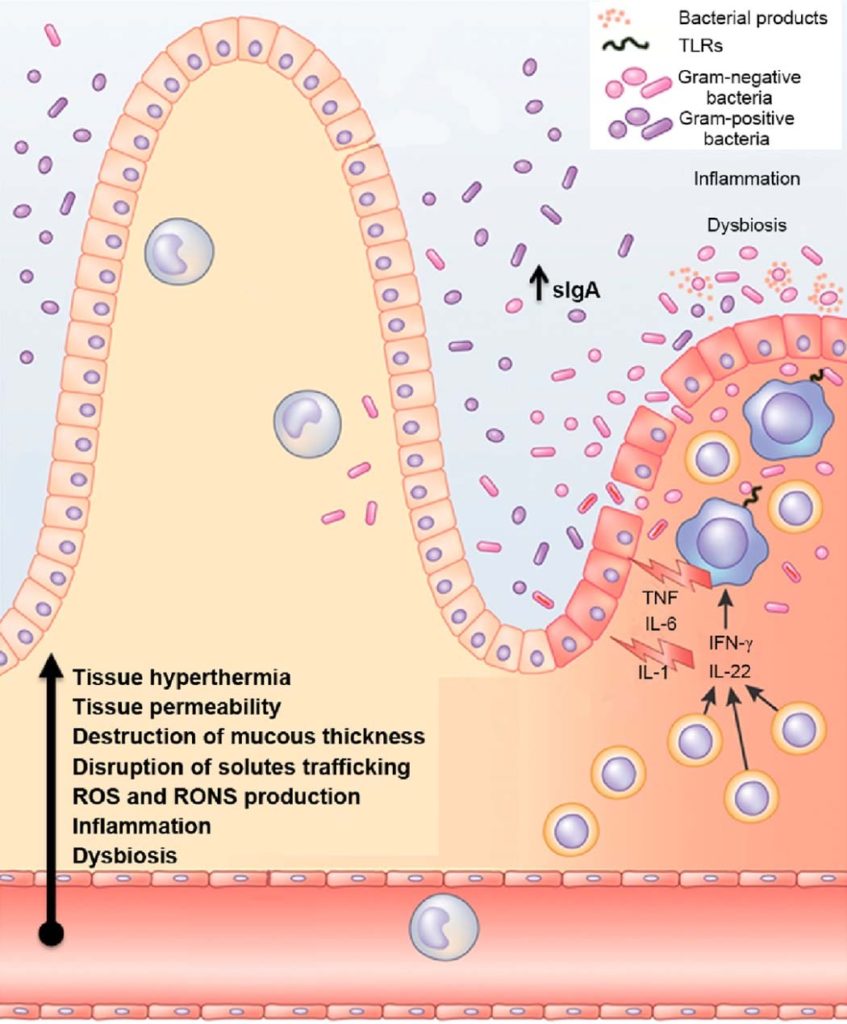Exercise and the Microbiome: Can You Outrun Your Gut Issues?

Contents
Millions of Americans struggle with digestive disorders, many of which are linked to imbalances in the microbiome.
Can exercise, and specifically running, help with lingering gut issues?
Let’s dive in to find out.
Exercise helps protect the gut lining
Although many common digestive issues, such as IBS and Candida, are associated with reduced microbial diversity in the colon, the causes are still not known . Some researchers are starting to blame a condition called “leaky gut,” characterized by the slow breakdown of the intestinal lining, for a host of these modern ailments. (R)
What exactly is leaky gut?
Aaron wrote an excellent post on leaky gut that walks the reader through the importance of maintaining the integrity of the gut barrier, the “epithelial wall” that keeps bacteria in our colon and out of our blood stream. When bacteria and undigested food “leak” out of what is supposed to be a closed system, they can trigger an immune system reaction and can also lead to the chronic infection of nearby organs.
While the science linking leaky gut to various chronic diseases, such as multiple sclerosis, is not yet established, it is not in dispute that the gut lining is prone to degradation, and that maintaining a healthy gut is associated with greater quality of life.
As Aaron has said:
let’s have a look at how the lining of the gut functions and how it could become leaky. The inside of your gut is lined with a single layer of epithelial cells which make up the mucosal barrier. These cells are highly specialised, having to allow absorption of all nutrients the body requires, whilst also stopping harmful compounds or invading microorganisms from passing across the mucosal barrier into the blood stream.
To do this, epithelial cells have two major protective features; firstly, they secrete mucus into the gut which acts to trap harmful microorganisms before they reach the epithelium. Secondly, they form an impermeable wall by linking together with so called “tight-junction” proteins. Importantly, as well as protective functions, these two features also promote healthy absorption of nutrients from the gut.
Part of the protective mucus Aaron refers to is made up of a substance called butyrate. Butyrate is a short chain fatty acid that our bodies make when fiber rich plant foods ferment in the colon. Part of butyrate’s job is to protect and line the gut so the bad guys can’t get through the intestinal wall and cause damage. More butyrate means better gut health and more energy, and elevated butyrate levels are even thought to be protective against colon cancer. (R)
With that in mind, let’s circle back to that morning run.
Exercise may help repair the gut
As with much of the microbiome discussion, the science here is still new, but studies show that cardiovascular fitness actually helps our bodies make more butyrate, and also contributes to the diversity of the good bacteria in our gut by as much as 20%. However, caution not to overdo it, because as we’ll learn, too much running can actually harm your intestinal lining and cause leaky gut. (R)
Let’s take a look at some of the studies that have researched how moderate exercise impacts gut health.
Even when accounting for all other factors, including diet, this study found that fit individuals, defined by their max VO2 output, had increased levels of butyrate as well as greater microbial diversity.
Similarly, this study found that athletes have much greater microbial diversity than those who are less physically active.
This University of Colorado study, which is part of the impressive American Gut Project, also found that moderate exercise increases the diversity of the microbiome.
Anecdotally, this Swedish study found significant reduction in IBS symptoms in a group that started exercising for 20-30 minutes vs. an IBS group that stayed physically inactive.
But before you go out and start training for that marathon, it’s important to realize that there can be too much of a good thing.
Too much exercise can harm the gut
I’m sure it is variable based on body type, diet, joint health, etc. but for most people, banging out 5-10 miles a day may give a runner’s high, but it also likely strains the heart and can lead to nagging injuries, although interestingly, long distance running seems to be protective against knee arthritis. (R)
My parents have a neighbor who is over 70 and competes in marathons. He’s in great shape, but may be the exception to the rule.
Studies show that endurance exercise oxidizes glutathione, one of the body’s most important endogenous, or “in-house” antioxidants. (R) To quote the Colorado study I cited above:
Moderate to frequent exercise would cause a full response of endogenous antioxidants; vigorous exercise could overwhelm the endogenous antioxidant response, which could lead to a chronic prooxidative/pro-inflammatory state.
Further, as the chart below demonstrates, overdoing it with running causes an inflammatory response in the body that can actually break down the intestinal barrier, leading to leaky gut and the health problems that come with it. (R)

Image and caption content adapted from Endurance Exercise and Microbiota: a Review
Moderate cardio for gut repair / maintenance
The studies I cite above, which show the greatest benefit to our microbiome from moderate exercise, are consistent with other studies that looked more generally at the health benefits of exercise. More cardio does not equate with greater returns. For example, this study which found that 10 minute interval training provided just as much benefit as 50 minutes of continuous exercise in men.
Twelve weeks of brief intense interval exercise improved indices of cardiometabolic health to the same extent as traditional endurance training in sedentary men, despite a five-fold lower exercise volume and time commitment
The glutathione oxidation study I cite to above as a reference is consistent with this interval study. There, researchers found that bursts of intense exercise to max capacity did nothing to glutathione levels, whereas long bouts of exercise (90 minutes) at 65% capacity dropped glutathione levels by 60% and increased oxidized glutathione by 100%.
Final thoughts
One glass of red wine a day is generally regarded as healthy for most people. A bottle a day isn’t. It would seem that the same principles apply to exercise. Done in moderation, and as part of an active life, activities like running actually help the body make protective short chain fatty acids we can use for energy and as part of the protective lining of the gut wall.
Taken too far, the body’s immune system believes it is under attack and releases an inflammatory cocktail that can contribute to problems with the gut.

